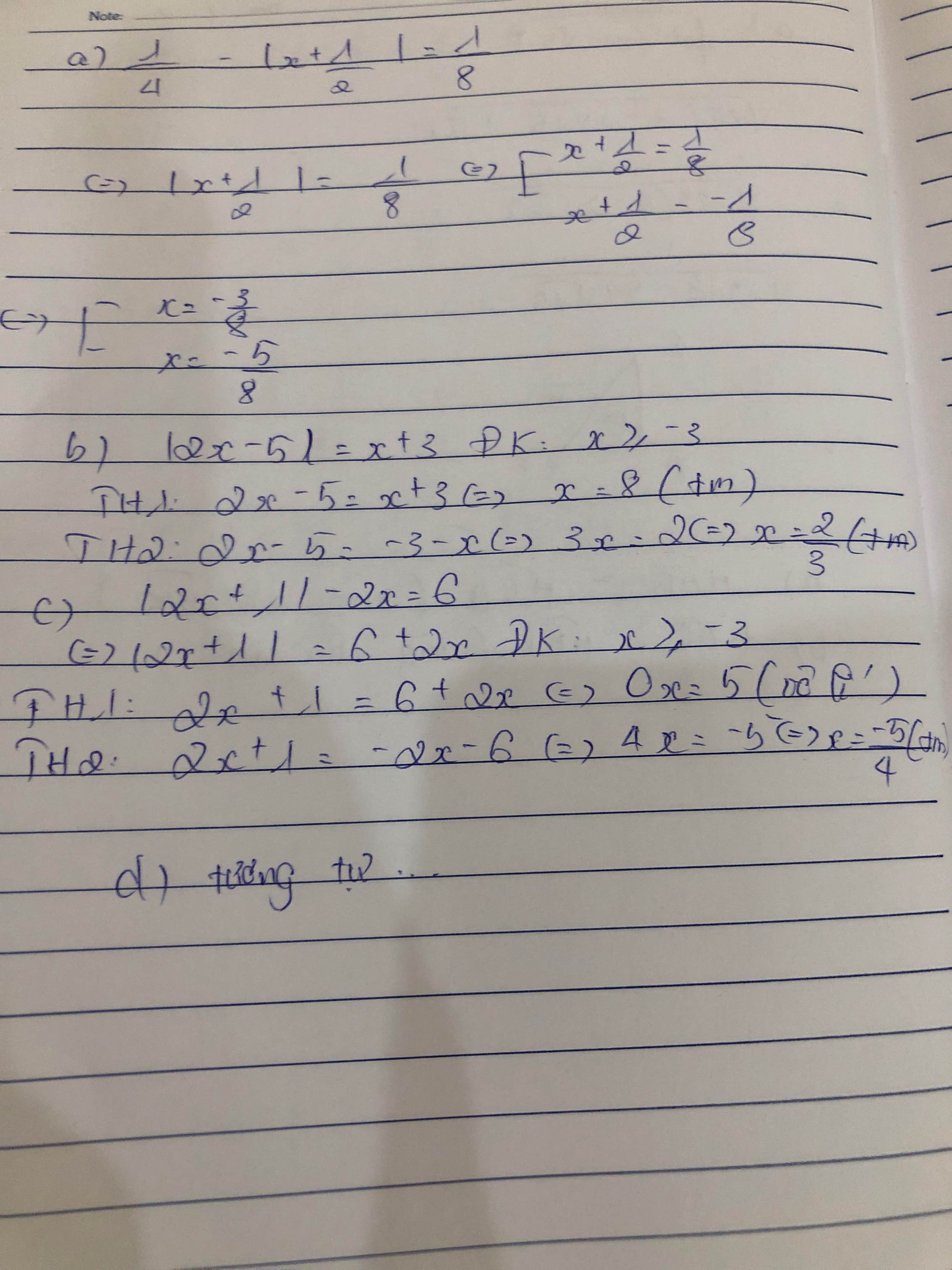Hãy nhập câu hỏi của bạn vào đây, nếu là tài khoản VIP, bạn sẽ được ưu tiên trả lời.
a) (2x-1)^3=27
b) (2x-1)^4=81
c) (x-2)^5=-32
d) (3x-1)^4=(3x-1)^6
đ) 5^x +5^x+2=650
g) 3^x-1 +5.3^x-1=162

a) (2x-1)3 = 27
(2x-1)3 = 93
2x-1 = 9
2x = 9+1
2x = 10
x = 10:5
x = 2
Vậy x = 2
b) (2x-1)4 = 81
(2x-1)4 = (\(\pm\)34)
2x-1 = \(\pm\)3
Trường hợp 1:
2x-1 = 3
2x = 3+1
2x = 4
x = 4:2
x = 2
Trường hợp 2:
2x-1 = -3
2x = -3+1
2x = -2
x = -2:2
x = -1
Vậy x \(\in[_{ }2;-1]\)
Vì không tìm thấy ngoặc nhọn nên mình dùng tạm ngoặc vuông nhé

a) Ta có: \(\dfrac{1}{4}-\left|x+\dfrac{1}{2}\right|=\dfrac{1}{8}\)
\(\Leftrightarrow\left|x+\dfrac{1}{2}\right|=\dfrac{1}{8}\)
\(\Leftrightarrow\left[{}\begin{matrix}x+\dfrac{1}{2}=\dfrac{1}{8}\\x+\dfrac{1}{2}=-\dfrac{1}{8}\end{matrix}\right.\Leftrightarrow\left[{}\begin{matrix}x=\dfrac{-3}{8}\\x=\dfrac{-5}{8}\end{matrix}\right.\)

a) \(2x+\frac{3}{15}=\frac{7}{5}\)
=> \(2x=\frac{7}{5}-\frac{3}{15}=\frac{21}{15}-\frac{3}{15}=\frac{18}{15}\)
=> \(x=\frac{18}{15}:2=\frac{18}{15}\cdot\frac{1}{2}=\frac{9}{15}\cdot\frac{1}{1}=\frac{9}{15}\)
b) \(x-\frac{2}{9}=\frac{8}{3}\)
=> \(x=\frac{8}{3}+\frac{2}{9}\)
=> \(x=\frac{24}{9}+\frac{2}{9}=\frac{26}{9}\)
c) \(\frac{-8}{x}=\frac{-x}{18}\)
=> x(-x) = (-8).18
=> -x2 = -144
=> x2 = 144(bỏ dấu âm)
=> x = \(\pm\)12
d) \(\frac{2x+3}{6}=\frac{x-2}{5}\)
=> 5(2x + 3) = 6(x - 2)
=> 10x + 15 = 6x - 12
=> 10x + 15 - 6x + 12 = 0
=> 4x + 27 = 0
=> 4x = -27
=> x = -27/4
e) \(\frac{x+1}{22}=\frac{6}{x}\)
=> x(x + 1) = 132
=> x(x + 1) = 11.12
=> x = 11
f) \(\frac{2x-1}{2}=\frac{5}{x}\)
=> x(2x - 1) = 10
=> 2x2 - x = 10
=> 2x2 - x - 10 = 0
tới đây tự làm đi nhé
g) \(\frac{2x-1}{21}=\frac{3}{2x+1}\)
=> (2x - 1)(2x + 1) = 63
=> 4x2 - 1 = 63
=> 4x2 = 64
=> x2 = 16
=> x = \(\pm\)4
h) Tương tự
a) \(\frac{2x+3}{15}=\frac{7}{5}\Leftrightarrow10x+15=105\Leftrightarrow10x=90\Rightarrow x=9\)
b) \(\frac{x-2}{9}=\frac{8}{3}\Leftrightarrow3x-6=72\Leftrightarrow3x=78\Rightarrow x=26\)
c) \(\frac{-8}{x}=\frac{-x}{18}\Leftrightarrow x^2=144\Leftrightarrow\orbr{\begin{cases}x=12\\x=-12\end{cases}}\)
d) \(\frac{2x+3}{6}=\frac{x-2}{5}\Leftrightarrow10x+15=12x-12\Leftrightarrow2x=27\Rightarrow x=\frac{27}{2}\)
e) \(\frac{x+1}{22}=\frac{6}{x}\Leftrightarrow x^2+x-132=0\Leftrightarrow\left(x-11\right)\left(x+12\right)=0\Leftrightarrow\orbr{\begin{cases}x=11\\x=-12\end{cases}}\)
f) \(\frac{2x-1}{2}=\frac{5}{x}\Leftrightarrow2x^2-x-10=0\Leftrightarrow\left(x-2\right)\left(2x+5\right)=0\Leftrightarrow\orbr{\begin{cases}x=2\\x=-\frac{5}{2}\end{cases}}\)
g) \(\frac{2x-1}{21}=\frac{3}{2x+1}\Leftrightarrow4x^2=64\Leftrightarrow x^2=16\Rightarrow\orbr{\begin{cases}x=4\\x=-4\end{cases}}\)
h) \(\frac{10x+5}{6}=\frac{5}{x+1}\Leftrightarrow10x^2+15x-25=0\Leftrightarrow5\left(x-1\right)\left(2x+5\right)=0\Leftrightarrow\orbr{\begin{cases}x=1\\x=-\frac{5}{2}\end{cases}}\)

`@` `\text {Ans}`
`\downarrow`
\(\dfrac{x-3}{3}=\dfrac{2x+1}{5}\)
`=> (x-3)5 = (2x+1)3`
`=> 5x-15 = 6x+3`
`=> 5x-6x = 15+3`
`=> -x=18`
`=> x=-18`
\(\dfrac{x+1}{22}=\dfrac{6}{x}\)
`=> (x+1)x = 22*6`
`=> (x+1)x = 132`
`=> x^2 + x = 132`
`=> x^2+x-132=0`
`=> (x-11)(x+12)=0`
`=>`\(\left[{}\begin{matrix}x-11=0\\x+12=0\end{matrix}\right.\)
`=>`\(\left[{}\begin{matrix}x=11\\x=-12\end{matrix}\right.\)
\(\dfrac{2x-1}{2}=\dfrac{5}{x}\)
`=> (2x-1)x = 2*5`
`=> 2x^2 - x =10`
`=> 2x^2 - x - 10 =0`
`=> 2x^2 + 4x - 5x - 10 =0`
`=> (2x^2 + 4x) - (5x+10)=0`
`=> 2x(x+2) - 5(x+2)=0`
`=> (2x-5)(x+2)=0`
`=>`\(\left[{}\begin{matrix}2x-5=0\\x+2=0\end{matrix}\right.\)
`=>`\(\left[{}\begin{matrix}2x=5\\x=-2\end{matrix}\right.\)
`=>`\(\left[{}\begin{matrix}x=\dfrac{5}{2}\\x=-2\end{matrix}\right.\)
\(\dfrac{2x-1}{21}=\dfrac{3}{2x+1}\)
`=> (2x-1)(2x+1)=21*3`
`=> 4x^2 + 2x - 2x - 1 = 63`
`=> 4x^2 - 1=63`
`=> 4x^2 - 1 - 63=0`
`=> 4x^2 - 64 = 0`
`=> 4(x^2 - 16)=0`
`=> 4(x^2 + 4x - 4x - 16)=0`
`=> 4[(x^2+4x)-(4x+16)]=0`
`=> 4[x(x+4)-4(x+4)]=0`
`=> 4(x-4)(x+4)=0`
`=>`\(\left[{}\begin{matrix}x-4=0\\x+4=0\end{matrix}\right.\)
`=>`\(\left[{}\begin{matrix}x=4\\x=-4\end{matrix}\right.\)
\(\dfrac{2x+1}{9}=\dfrac{5}{x+1}\)
`=> (2x+1)(x+1) = 9*5`
`=> (2x+1)(x+1)=45`
`=> 2x^2 + 2x + x + 1 = 45`
`=> 2x^2 + 3x + 1 =45`
`=> 2x^2 + 3x + 1 - 45 =0`
`=> 2x^2+3x-44=0`
`=> 2x^2 + 11x - 8x - 44=0`
`=> (2x^2 +11x) - (8x+44)=0`
`=> x(2x+11) - 4(2x+11)=0`
`=> (x-4)(2x+11)=0`
`=>`\(\left[{}\begin{matrix}x-4=0\\2x+11=0\end{matrix}\right.\)
`=>`\(\left[{}\begin{matrix}x=4\\2x=-11\end{matrix}\right.\)
`=>`\(\left[{}\begin{matrix}x=4\\x=-\dfrac{11}{2}\end{matrix}\right.\)
\(\dfrac{x-3}{3}=\dfrac{2x+1}{5}\\ \left(x-3\right)\cdot5=\left(2x+1\right)\cdot3\\ x5-15=6x+3\\ x5-6x=3+15\\ -x=18\\ \Rightarrow x=-18\)
\(\dfrac{x+1}{22}=\dfrac{6}{x}\\ \left(x+1\right)\cdot x=6\cdot22\\ \left(x+1\right)\cdot x=2\cdot3\cdot2\cdot11\\ \left(x+1\right)\cdot x=12\cdot11\\ \Rightarrow x=11\)
\(\dfrac{2x-1}{21}=\dfrac{3}{2x+1}\\ \left(2x-1\right)\cdot\left(2x+1\right)=21\cdot3\\ \left(2x-1\right)\cdot\left(2x+1\right)=7\cdot3\cdot3\\ \left(2x-1\right)\cdot\left(2x+1\right)=7\cdot9\\ \Rightarrow2x+1=9\\ 2x=8\\ x=4\)

a) Ta có: \(\dfrac{4}{5}-3\left|x\right|=\dfrac{1}{5}\)
\(\Leftrightarrow3\left|x\right|=\dfrac{4}{5}-\dfrac{1}{5}=\dfrac{3}{5}\)
\(\Leftrightarrow\left|x\right|=\dfrac{1}{5}\)
hay \(x\in\left\{\dfrac{1}{5};-\dfrac{1}{5}\right\}\)
b) Ta có: \(4x-\dfrac{1}{2}x+\dfrac{3}{5}x=\dfrac{4}{5}\)
nên \(\dfrac{41}{10}x=\dfrac{4}{5}\)
hay \(x=\dfrac{8}{41}\)
c) Ta có: \(\left(2x-8\right)\left(10-5x\right)=0\)
\(\Leftrightarrow\left[{}\begin{matrix}2x-8=0\\10-5x=0\end{matrix}\right.\Leftrightarrow\left[{}\begin{matrix}2x=8\\5x=10\end{matrix}\right.\Leftrightarrow\left[{}\begin{matrix}x=4\\x=2\end{matrix}\right.\)
d) Ta có: \(\dfrac{3}{4}+\dfrac{1}{4}\left|2x-1\right|=\dfrac{7}{2}\)
\(\Leftrightarrow\dfrac{1}{4}\left|2x-1\right|=\dfrac{7}{2}-\dfrac{3}{4}=\dfrac{14}{4}-\dfrac{3}{4}=\dfrac{11}{4}\)
\(\Leftrightarrow\left|2x-1\right|=11\)
\(\Leftrightarrow\left[{}\begin{matrix}2x-1=11\\2x-1=-11\end{matrix}\right.\Leftrightarrow\left[{}\begin{matrix}2x=12\\2x=-10\end{matrix}\right.\Leftrightarrow\left[{}\begin{matrix}x=6\\x=-5\end{matrix}\right.\)

\(a,\Leftrightarrow-\dfrac{1}{2}x=\dfrac{1}{4}\Leftrightarrow x=-\dfrac{1}{2}\\ b,\Leftrightarrow\dfrac{1}{6}:x=\dfrac{1}{2}+\dfrac{1}{3}=\dfrac{5}{6}\Leftrightarrow x=\dfrac{1}{6}:\dfrac{5}{6}=\dfrac{1}{5}\\ c,\Leftrightarrow\left[{}\begin{matrix}x+\dfrac{1}{5}=3\\x+\dfrac{1}{5}=-3\end{matrix}\right.\Leftrightarrow\left[{}\begin{matrix}x=\dfrac{14}{5}\\x=-\dfrac{16}{5}\end{matrix}\right.\)
\(d,\Leftrightarrow\left(x+\dfrac{1}{2}\right)^2=\dfrac{22}{9}-\dfrac{7}{3}=\dfrac{1}{9}\\ \Leftrightarrow\left[{}\begin{matrix}x+\dfrac{1}{2}=\dfrac{1}{3}\\x+\dfrac{1}{2}=-\dfrac{1}{3}\end{matrix}\right.\Leftrightarrow\left[{}\begin{matrix}x=-\dfrac{1}{6}\\x=-\dfrac{5}{6}\end{matrix}\right.\\ e,\Leftrightarrow2\left|x\right|=2-\dfrac{1}{2}=\dfrac{3}{2}\\ \Leftrightarrow\left[{}\begin{matrix}2x=\dfrac{3}{2}\\2x=-\dfrac{3}{2}\end{matrix}\right.\Leftrightarrow\left[{}\begin{matrix}x=\dfrac{3}{4}\\x=-\dfrac{3}{4}\end{matrix}\right.\)
\(f,\Leftrightarrow\left|x+\dfrac{1}{2}\right|=1+\dfrac{1}{6}=\dfrac{7}{6}\\ \Leftrightarrow\left[{}\begin{matrix}x+\dfrac{1}{2}=\dfrac{7}{6}\\x+\dfrac{1}{2}=-\dfrac{7}{6}\end{matrix}\right.\Leftrightarrow\left[{}\begin{matrix}x=\dfrac{2}{3}\\x=-\dfrac{5}{3}\end{matrix}\right.\)
e: ta có: \(2\left|x\right|+\dfrac{1}{2}=2\)
\(\Leftrightarrow2\left|x\right|=\dfrac{3}{2}\)
\(\Leftrightarrow\left|x\right|=\dfrac{3}{4}\)
hay \(x\in\left\{\dfrac{3}{4};-\dfrac{3}{4}\right\}\)

Bài 1:
a) Ta có: \(\dfrac{17}{6}-x\left(x-\dfrac{7}{6}\right)=\dfrac{7}{4}\)
\(\Leftrightarrow\dfrac{17}{6}-x^2+\dfrac{7}{6}x-\dfrac{7}{4}=0\)
\(\Leftrightarrow-x^2+\dfrac{7}{6}x+\dfrac{13}{12}=0\)
\(\Leftrightarrow-12x^2+14x+13=0\)
\(\Delta=14^2-4\cdot\left(-12\right)\cdot13=196+624=820\)
Vì Δ>0 nên phương trình có hai nghiệm phân biệt là:
\(\left\{{}\begin{matrix}x_1=\dfrac{14-2\sqrt{205}}{-24}=\dfrac{-7+\sqrt{205}}{12}\\x_2=\dfrac{14+2\sqrt{2015}}{-24}=\dfrac{-7-\sqrt{205}}{12}\end{matrix}\right.\)
b) Ta có: \(\dfrac{3}{35}-\left(\dfrac{3}{5}-x\right)=\dfrac{2}{7}\)
\(\Leftrightarrow\dfrac{3}{5}-x=\dfrac{3}{35}-\dfrac{10}{35}=\dfrac{-7}{35}=\dfrac{-1}{5}\)
hay \(x=\dfrac{3}{5}-\dfrac{-1}{5}=\dfrac{3}{5}+\dfrac{1}{5}=\dfrac{4}{5}\)

Lời giải:
a.
$|2x-5|=12-3x$
Nếu $x\geq \frac{5}{2}$ thì $2x-5=12-3x$
$\Leftrightarrow x=3,4$ (thỏa mãn)
Nếu $x< \frac{5}{2}$ thì: $5-2x=12-3x$
$\Leftrightarrow x=7$ (loại)
Vậy......
b.
$4x=|x+1|+|x+2|+|x+3|\geq 0$
$\Rightarrow x\geq 0$
Do đó: $|x+1|+|x+2|+|x+3|=(x+1)+(x+2)+(x+3)=3x+6$
Vậy: $3x+6=4x$
$\Leftrightarrow x=6$ (thỏa mãn)
c.
$|x^2+|x+2||=x^2+3$
$\Leftrightarrow x^2+|x+2|=x^2+3$
$\Leftrightarrow |x+2|=3$
$\Leftrightarrow x+2=3$ hoặc $x+2=-3$
$\Leftrightarrow x=1$ hoặc $x=-5$
d.
$|x^2-3|=6$
$\Leftrightarrow x^2-3=6$ hoặc $x^2-3=-6$
$\Leftrightarrow x^2=9$ (chọn) hoặc $x^2=-3< 0$ (loại)
$\Leftrightarrow x=\pm 3$

a)(2x-1)6=(2x-1)8
<=>(2x-1)8-(2x-1)6=0
<=>(2x-1)6[(2x-1)2-1)]=0
TH1.2x-1=0=>2x=1=>x=1/2
TH2.(2x-1)2-1=0=>(2x-1)2=1=>2x-1=1=>2x=2=>x=1
b)5x+5x+2=650=>5x(1+52)=650=>5x=25=>x=2
c)3x-1+5.3x-1=162=>3x-1(1+5)=162=>3x-1=27=>3x=9=32=>x=2
a/ ( 2x - 1 ) 6 = ( 2x - 1 ) 8
Mà chỉ có 0 và 1 là thỏa mãn trên
Nên 2x - 1 = 0 thì 2x = 1 (sai)
2x - 1 = 1 thì 2x = 2 => x = 1 (t/m)